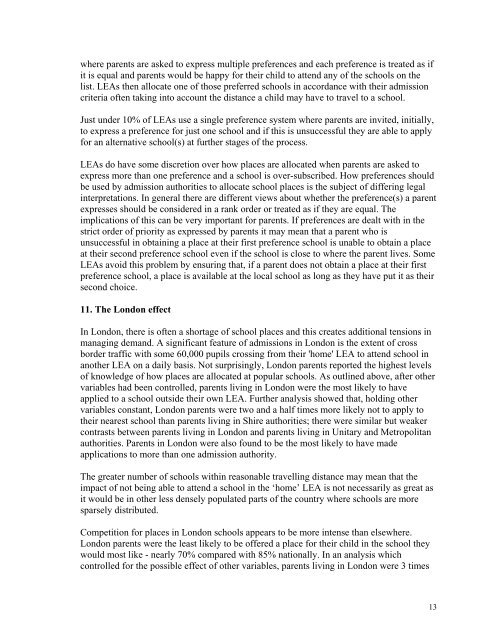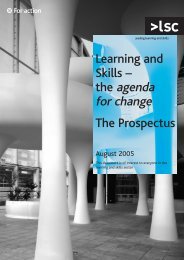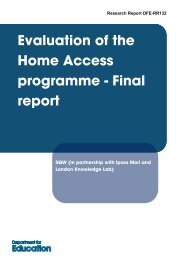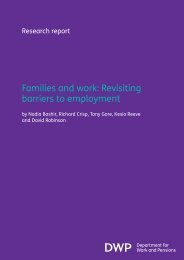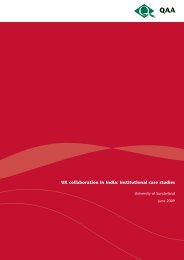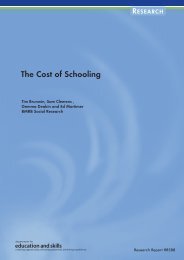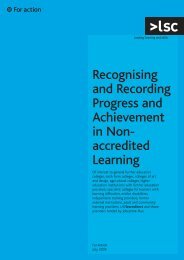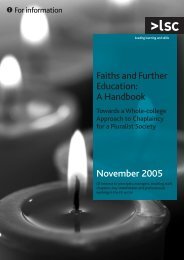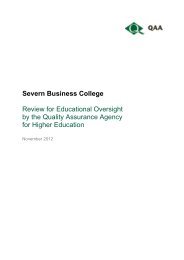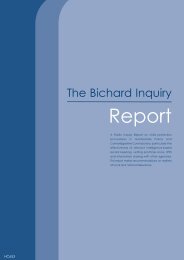Parents' Experiences of the Process of Choosing a Secondary School
Parents' Experiences of the Process of Choosing a Secondary School
Parents' Experiences of the Process of Choosing a Secondary School
Create successful ePaper yourself
Turn your PDF publications into a flip-book with our unique Google optimized e-Paper software.
where parents are asked to express multiple preferences and each preference is treated as if<br />
it is equal and parents would be happy for <strong>the</strong>ir child to attend any <strong>of</strong> <strong>the</strong> schools on <strong>the</strong><br />
list. LEAs <strong>the</strong>n allocate one <strong>of</strong> those preferred schools in accordance with <strong>the</strong>ir admission<br />
criteria <strong>of</strong>ten taking into account <strong>the</strong> distance a child may have to travel to a school.<br />
Just under 10% <strong>of</strong> LEAs use a single preference system where parents are invited, initially,<br />
to express a preference for just one school and if this is unsuccessful <strong>the</strong>y are able to apply<br />
for an alternative school(s) at fur<strong>the</strong>r stages <strong>of</strong> <strong>the</strong> process.<br />
LEAs do have some discretion over how places are allocated when parents are asked to<br />
express more than one preference and a school is over-subscribed. How preferences should<br />
be used by admission authorities to allocate school places is <strong>the</strong> subject <strong>of</strong> differing legal<br />
interpretations. In general <strong>the</strong>re are different views about whe<strong>the</strong>r <strong>the</strong> preference(s) a parent<br />
expresses should be considered in a rank order or treated as if <strong>the</strong>y are equal. The<br />
implications <strong>of</strong> this can be very important for parents. If preferences are dealt with in <strong>the</strong><br />
strict order <strong>of</strong> priority as expressed by parents it may mean that a parent who is<br />
unsuccessful in obtaining a place at <strong>the</strong>ir first preference school is unable to obtain a place<br />
at <strong>the</strong>ir second preference school even if <strong>the</strong> school is close to where <strong>the</strong> parent lives. Some<br />
LEAs avoid this problem by ensuring that, if a parent does not obtain a place at <strong>the</strong>ir first<br />
preference school, a place is available at <strong>the</strong> local school as long as <strong>the</strong>y have put it as <strong>the</strong>ir<br />
second choice.<br />
11. The London effect<br />
In London, <strong>the</strong>re is <strong>of</strong>ten a shortage <strong>of</strong> school places and this creates additional tensions in<br />
managing demand. A significant feature <strong>of</strong> admissions in London is <strong>the</strong> extent <strong>of</strong> cross<br />
border traffic with some 60,000 pupils crossing from <strong>the</strong>ir 'home' LEA to attend school in<br />
ano<strong>the</strong>r LEA on a daily basis. Not surprisingly, London parents reported <strong>the</strong> highest levels<br />
<strong>of</strong> knowledge <strong>of</strong> how places are allocated at popular schools. As outlined above, after o<strong>the</strong>r<br />
variables had been controlled, parents living in London were <strong>the</strong> most likely to have<br />
applied to a school outside <strong>the</strong>ir own LEA. Fur<strong>the</strong>r analysis showed that, holding o<strong>the</strong>r<br />
variables constant, London parents were two and a half times more likely not to apply to<br />
<strong>the</strong>ir nearest school than parents living in Shire authorities; <strong>the</strong>re were similar but weaker<br />
contrasts between parents living in London and parents living in Unitary and Metropolitan<br />
authorities. Parents in London were also found to be <strong>the</strong> most likely to have made<br />
applications to more than one admission authority.<br />
The greater number <strong>of</strong> schools within reasonable travelling distance may mean that <strong>the</strong><br />
impact <strong>of</strong> not being able to attend a school in <strong>the</strong> ‘home’ LEA is not necessarily as great as<br />
it would be in o<strong>the</strong>r less densely populated parts <strong>of</strong> <strong>the</strong> country where schools are more<br />
sparsely distributed.<br />
Competition for places in London schools appears to be more intense than elsewhere.<br />
London parents were <strong>the</strong> least likely to be <strong>of</strong>fered a place for <strong>the</strong>ir child in <strong>the</strong> school <strong>the</strong>y<br />
would most like - nearly 70% compared with 85% nationally. In an analysis which<br />
controlled for <strong>the</strong> possible effect <strong>of</strong> o<strong>the</strong>r variables, parents living in London were 3 times<br />
13


